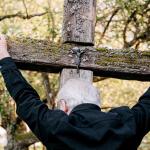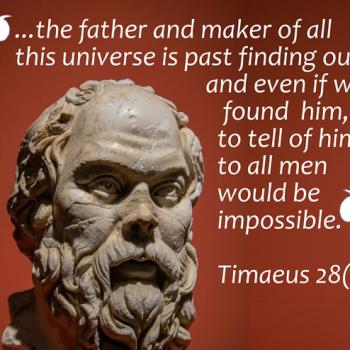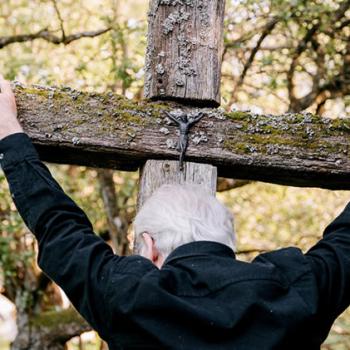
This is Part 2 of my response to two great scholars, Krister Stendahl and N.T. Wright. Both made critical comments about how “western” individualism has negatively affected a proper reading of Jesus and Paul. Recently I read a comment by an Asian Christian scholar claiming that seeking revival is “an American phenomenon.” I decided to throw my hat into the ring as an Early Church historian to show how Christianity has always had a strong pull towards individualism.
In the first section I offered evidence from the New Testament for personal forgiveness. In Part 2, I want to present the evidence of what was perhaps an unhealthy individualism in the second and third century Church.
Forgiveness in the Second and Third Centuries
To understand how many second century Christians viewed forgiveness of sin and salvation, we must keep in mind the threat of Roman persecution. The arguments we will read during this period are largely based on two verses: 1 John 5:16-17 – sin that “leads to death” and sin that “does not lead to death.”
These two verses were used by some important Christian writers in the late second century to discuss an important issue called “Second Repentance.” [For a more exhaustive treatment of this issue, you can download my paper on “Second Repentance.”]
An initial reading of 1 John 5:16-17 certainly leads the average hearer or reader to think about “sin” and “forgiveness” on a personal level. Only around 5-10% of the population in the first couple of centuries could read and write. The average Christian would hear texts read out loud in church on Sunday and the role of the pastor/teacher was to explain the text.
Bishop Ignatius of Antioch (cir. 108-117 AD)
This is where a critique of “extreme” Christian individualism might begin, with the letters of Ignatius, the bishop of Antioch. Ignatius was arrested during a time of persecution and was taken under guard to Rome where he was eventually martyred. In his letter To the Romans Ignatius appears to have some fear of being thrown to the wild beasts in the Colosseum. He fears that he may fail the test of martyrdom. He tells the Roman church not to intercede with officials on his behalf in order to save his life:
“If I shall suffer, you have wished me well; but if I am rejected [from being martyred], you have hated me.” Ltr to the Romans 8
Ignatius is an early example of what later becomes the “Cult of the Martyrs,” those executed by the Romans for their faith who become heroes. We find an intense motivation to be faithful to the death in several second century documents [1 Clement 7.1,2; The Letters of Ignatius; Martyrdom of Polycarp 3.3; Epistle of Barnabas 4.1 and others]. Roman persecution brought new dimensions into early Christianity: greater potential for apostasy (denying the faith) and the issue of “Second Repentance.” These new dynamics bring with them aspects of individualism that, to some degree, dominated the Church for the next 200 years.
Shepherd of Hermas
The Shepherd of Hermas is an early second century document that reflects how Roman persecution had become a reality. [Clement of Alexandria, Origen, Athanasius and Didymus the Blind all accepted this text as “inspired.”]
Persecution was typically regional and usually did not last for lengthy periods of time, yet had a psychological and emotional impact on the Church and on individuals. The Shepherd of Hermas is the first Christian writing that mentions the issue of “Second Repentance.”
The Shepherd opens with Hermas being confronted by a beautiful woman in a vision. He had seen her earlier as she was bathing in the river and the text reads that he had no wicked thoughts. He falls asleep and has a vision. This same woman appears in his dream and accuses him of having lustful thoughts towards her. The heavens shut for Hermas and he is overwhelmed with fear wondering, “How can I be saved?” This is the tone of The Shepherd. There is a constant sense that the Christian can be beyond forgiveness.
Repentance is the overall theme of The Shepherd, but a second chance, a “second repentance” for backslidden believers plays a dominate role as well. There are several references to those who deny Christ (during persecution), or commit adultery, and also several references to repentance. This text from a section titled Mandate 4 summarizes the entire document:

During periods of Roman persecution it was not unusual in a larger city for a significant number of believers to stop attending church meetings and “lapse” (fall away or “backslide”) under the pressure. Some simply hid in the shadows, but others found it easy to go back to riotous living. Once the persecution lifted bishops might face dozens of lapsed believers desiring to be readmitted to the church. Lapsing during persecution was seen as a serious offense, especially when some were imprisoned, tortured or even killed for standing strong. Lapsed believers were not allowed to enter into the church meeting. Some felt beyond forgiveness, others decided they did not want to come back.
In North Africa some lapsed believers would dress in rags to show their penance, lay prostrate in the outer foyer or even in the street where the elders and widows would enter, and beg for prayer and forgiveness [Tertullian, On Purity 13]. The elders would allow them to continue in penance until the Lord somehow showed His mercy to them.
Tertullian is not fond of The Shepherd of Hermas, referring to this “second repentance” as favoring “adulterers” [Tertullian, On Modesty 10.12.]. Some were seeking forgiveness for what Tertullian called mortal sins: apostasy, adultery, and fornication. The Shepherd indicates that many bishops were willing to grant such forgiveness. Callistus, bishop of Rome, was said to produce a decree (cir. 217-222) authorizing bishops to allow absolution for penitent adulterers. This greatly angered Tertullian. In response, he writes On Purity. He is critical of the idea that an adulterer could be proclaimed “forgiven” by one bishop while forgiveness might be withheld from the one who failed to make the good confession of Christ under threat of torture [On Purity 22].
The issue of “Second Repentance” is what led some Christian writers to consider and attempt to explain the 1 John 5:16-17 text. Two of these writers (Clement of Alexandria and Tertullian) divide “sins” into categories. Clement speaks of “second repentance” and devotes three chapters to this concept [Strom II.12-15], but he is not as focused nor as clear as Tertullian.
Tertullian is the first Christian writer to differentiate between mortal and venial sins. After introducing the concept of two types of sins, he is attempting to explain 1 John 5:16,17 in his tract On Purity;

In this quick survey I hope you can see why Christians in the second century focused on personal forgiveness. The 1 John 5 text gives the impression that personal sin can be serious and forgiveness might not always be accessible. The readings from these early Christian writers represent explanations a common Christian might hear. We can begin to “feel” the possible angst that would lead to an obsession with personal forgiveness. In addition there were apocalyptic writings floating around like the Apocalypse of Peter and others that depict the torments of Hell.
Where Roman persecution and the fear of “lapsing” failed to inspire Christians to live a holy life, perhaps hearing Tales from the Crypt of apocalyptic writings would keep them on track. Nobody could have predicted the future, but the next round of Christian individualism has possibly never been equaled.













